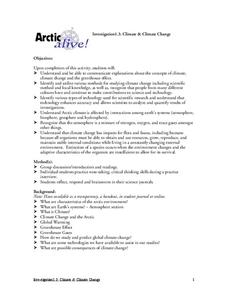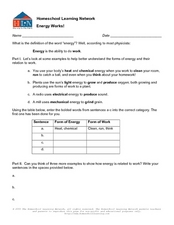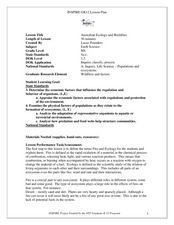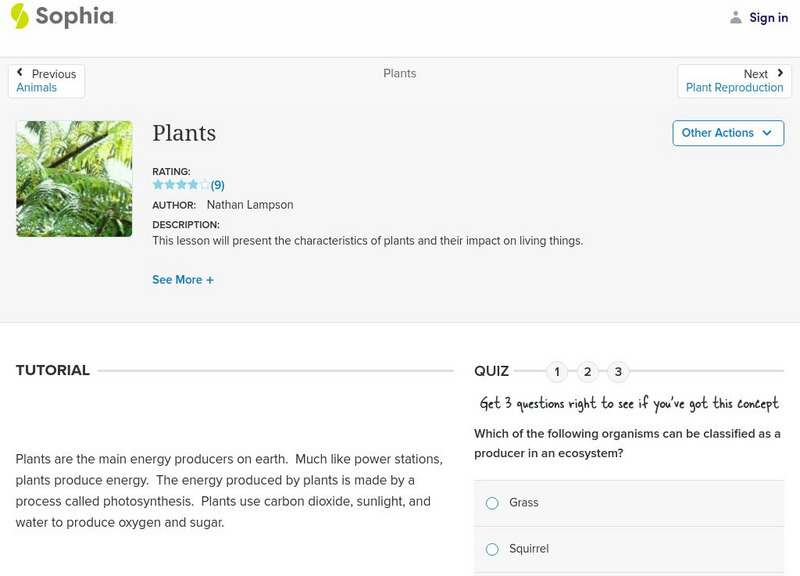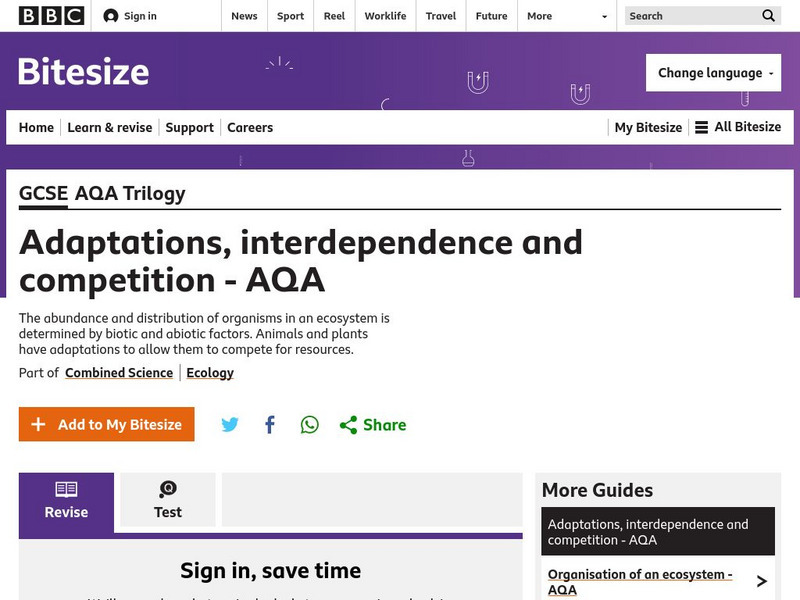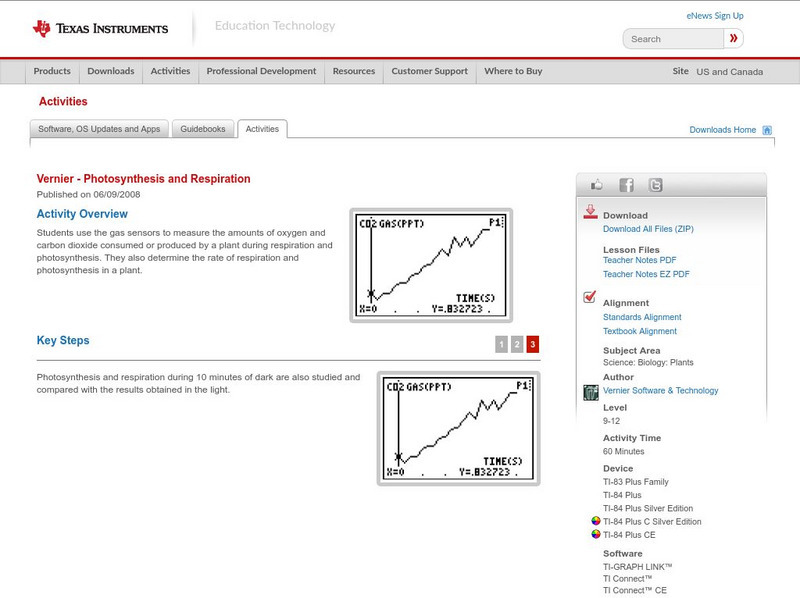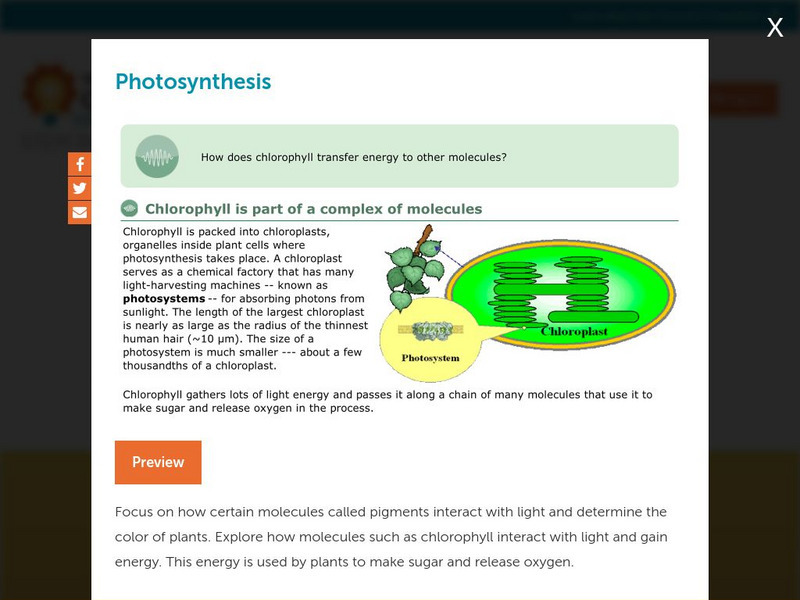Curated OER
Snowball Fight
Students examine the weather conditions throughout the globe. As a class, they discover the impact of snow on various types of crops. In groups, they participate in an experiment in which they form raindrops and calculate the...
Curated OER
CO Buildup City
Students conduct a controlled experiment. They collect data in an organized manner. Students analyze data to reach a conclusion and communicate findings. They explain how city size, temperature, and pollution is related to the air quality.
Curated OER
What's Making It Look So Brown Outside?
Ninth graders analyze cars and particulate matter in the atmosphere. They analyze results of particulate pollutants and identify which vehicle gives off more particulates. They identify sources of particulate matter and relate to...
Curated OER
It's Okay to Exhale: Photosynthesis and Cellular Respiration
Students will observe the differences between photosynthesis and cellular respiration. Then they observe the links due to climate changes and relate how climate change affects their lives.
Curated OER
Environment: Climate Change
Students explore climate change and the greenhouse effect. Using provided definitions, they assess local weather conditions and analyze long term climatic data for their areas. Once they explore the concept of and connection between...
Curated OER
Rainforest
In this biology worksheet, students identify and locate various vocabulary terms that are related to the rain forest. There are 24 biology terms located in the word search.
Curated OER
Prepositions and Prepositional Phrases
In these prepositional phrases worksheets, students review the definitions and examples for prepositional phrases, prepositions, and object of prepositions. Students then complete three pages of activities for prepositions.
Curated OER
Energy Works!
In this energy worksheet, students review the different types of energy and determine what form of work that energy provides. Then students give examples of how energy is related to work. This worksheet has 1 graphic organizer and 3...
Curated OER
Australian Ecology and Bushfires
Eighth graders discuss the different types of ecosystem. In this earth science lesson, 8th graders explain the benefits and harm of fire. They research articles about bush fires or controlled burn instance and share it with the class.
Bio Topics
Bio Topics: Photosynthesis
This site details the process of photosynthesis. Photosynthesis is the process of the production of oxygen by plants and carbon dioxide by animals, both of which are needed for respiration purposes.
Sophia Learning
Sophia: Plants: Lesson 5
This lesson will present the characteristics of plants and their impact on living things. It is 5 of 5 in the series titled "Plants."
Science Buddies
Science Buddies: Measure Photosynthesis With Floating Leaves
In this activity, you will be able to observe the oxygen production in leaves by doing a floating leaf disk experiment. You can also find out how quickly plants produce oxygen, and what variables affect photosynthesis.
NOAA
Noaa: Estuaries 101 Curriculum: Survival in an Estuary
This activity introduces students to the nature of estuaries, estuarine environmental factors, and four important abiotic factors-pH, temperature, dissolved oxygen, and salinity-and how they vary in estuaries. A PowerPoint presentation,...
Nature Research
Nature Education: Energy Economics in Ecosystems
This article discusses how plants and microorganisms, until recently, have mostly controlled how much carbon dioxide is released into an ecosystem, and explains how this process works. Humans' burning of fossil fuels has upset the...
Channel 4 Learning
4 Learning: Science Essentials: Interdependence and Adaptation
Article describes the importance of green plants and the ideal conditions they need to produce the food and oxygen people need to live.
BBC
Bbc: Gcse Bitesize: Adaptations, Interdependence and Competition Aqa
The abundance and distribution of organisms in an ecosystem is determined by biotic and abiotic factors. Animals and plants have adaptations to allow them to compete for resources.
Concord Consortium
Concord Consortium: Stem Resources: Photosynthesis
This activity introduces the concept of plant color being determined by pigments, which interactive with light. The idea that chlorophyll is used by plants for energy is then discussed, along with the first step of the photosynthetic...
Texas Instruments
Texas Instruments: Photosynthesis and Respiration
Students use the gas sensors to measure the amounts of oxygen and carbon dioxide consumed or produced by a plant during respiration and photosynthesis. They also determine the rate of respiration and photosynthesis in a plant.
Next.cc
Next: Air
Multiple activities explore and explain why plants and animals need air to survive.
Treehut
Suzy's World: How Does a Tree Eat?
Use site from Suzy's world, which is a personal site from Suzy Cato, in order to learn how plants and trees "eat." Content includes fun facts and great experiment.
Science4Fun
Science4 Fun: Photosynthesis
What is photosynthesis? Discover how plants absorb ingredients, the phases of the process, and the importance.
Concord Consortium
Concord Consortium: Photosynthesis
Focus on how certain molecules called pigments interact with light and determine the color of plants. Explore how molecules such as chlorophyll interact with light and gain energy. This energy is used by plants to make sugar and release...
Environmental Education for Kids
Eek!: Evergreens
Site chronicles Wisconsin's Evergreen and Conifer trees. There are descriptions of the various tree types. Additionally, site details the uses of these trees in nature. Ideal for grades 4-8.
Environmental Education for Kids
Eek!: Activity: Trees and Air Quality
Site offers lessons and activities designed to supplement study of the environment and ecology. Concise explanations are presented on the importance of trees in our world. Also, problem solving and creative thinking is encouraged...






